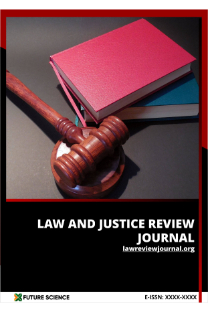SCOPE OF DIPLOMATIC FAMILY IN VIENNA CONVENTION ON DIPLOMATIC RELATIONS
Diplomatik İlişkiler Hakkında Viyana Konvansiyonuna Göre Diplomatik Ailenin Kapsamı
___
Barker JC: The Abuse of Diplomatic Privileges and Immunities: A Necessary Evil? (Aldershot: Dartmouth), (1996).Benedek M L: The Diplomatic Relations Act: The United States Protects Its Own, 5 Brooklyn Journal of the International Law, 379, 385-87 (1979).
Circular Note: Conditions for Granting Privileged Status of the Children of Diplomatic Agents and Administrative and Technical Staff Members in Diplomatic Missions, (10 December 2010).
Circular Note: The Privileged Status of the Spouses and Unmarried Legal Partners of the Staff Members of Diplomatic Mission, (16 May 2008). Available at: http://diplomatie.belgium.be/en. Accessed on 25.12.2012/ Accessed 25.12.2012.
Denza E: Diplomatic Law, 3rd edn, Oxford, (2008).
Diplomatic Handbook: Protocol Department of Ministry for Foreign Affairs, Reykjavik, (March 2010). Available at: http://www.mfa.is/ Accessed 25.12.2012.
Diplomatic Relations Act: Pub. L. No. 95-393, 92 Stat. 808 (1978).
Evans Malcolm D: International Law, 3rd edn, Oxford, (2010).
Harris David: Cases and Materials of International Law, 7th ed, (2010).
Hill M: Immunities and Privileges of Officials of the League of Nations, (1945).
Jones R. G.: Termination of Diplomatic Immunity (1948) 25 British Yearbook of International Law.
Ling Yu-Long: A Comparative Study of the Privileges and Immunities of United Nations, Washington and Lee Law Review Vol. XXXIII, winter 1976, No. 1.
McClanahan G V: Diplomatic Immunity: Principles, Practices, Problems, London, (1989).
Moutzouris Maria: Sending and Receiving: Immunity Sought by Diplomats Committing Criminal Offences, Thesis of Masters, Rhodes University. Available at: http:// www.eprints.ru.ac.za/ Accessed 15.12.2012.
Protocol Guide for Diplomatic Missions and Consular Posts, Protocol Department of Ministry of Foreign Affairs (March 2012). Available at: http//www.government.nl. Accessed 24.12.2012.
Ogdon M.: Juridical Basis of Diplomatic Immunity: A Study in the Origin, Growth and Purpose of the Law, John Byrne& Co.: Washington D.C. (1936).
Ross Mitchell S.: Rethinking Diplomatic Immunity: A Review of Remedial Approaches to Address the Abuses of Diplomatic Privileges and Immunities American University Journal of International Law&Policy, Volume 4:173.
Satow E.: Satows Guide to Diplomatic Practice, p. 106 (Lord GoreBooth 5th edition 1979).
Sen B.: A Diplomats Handbook of International Law and Practice, (1965).
Shaw Malcolm N.: International Law, 6th edn, Cambridge, (2008).
Wickremasinghe Chanaka: Immunities Enjoyed by Officials of States and International Organizations edited by Malcolm D. Evans, International Law, 3rd edn, Oxford, 2010.
Wilson Robert A: Diplomatic Immunity from criminal Jurisdiction: Essential to Effective International Relations, 7 Loyola of Los Angeles International and Comparative Law Review 113 (1984).
Yearbook of the International Law Commission, vol. I, (1958).
Yearbook of the International Law Commission, vol. II, (1958).
http://meriam-webster.com. Accessed 24.12.2012.
http://oxforddictionaries.com/definition. reached at 24. 12. Accessed 24.12. 2012.
- ISSN: 1309-9485
- Yayın Aralığı: 2
- Başlangıç: 2010
- Yayıncı: Türkiye Adalet Akademisi
RELIGION-STATE NEXUS IN THE MIDDLE EAST
MANDATORY TAKEOVER BIDS IN TURKEY: AN OVERVIEW OF THE NEW LEGAL REGIME
CONTESTING THE RESOLUTIONS OF SHAREHOLDERS BEFORE A COURT OF LAW IN POLAND
PERSONAL DATA PROTECTION: A EUROPEAN VALUE IN THE EU INTEGRATION PROCESS
INTERNATIONAL COOPERATION AGAINST ILLICIT TRAFFICKING OF CULTURAL PROPERTY*
Bilge ATEŞ, Şule ÇAĞLAR, Muhammet Sacit KÖSEOĞLU, 2Yusuf ÇİMEN
